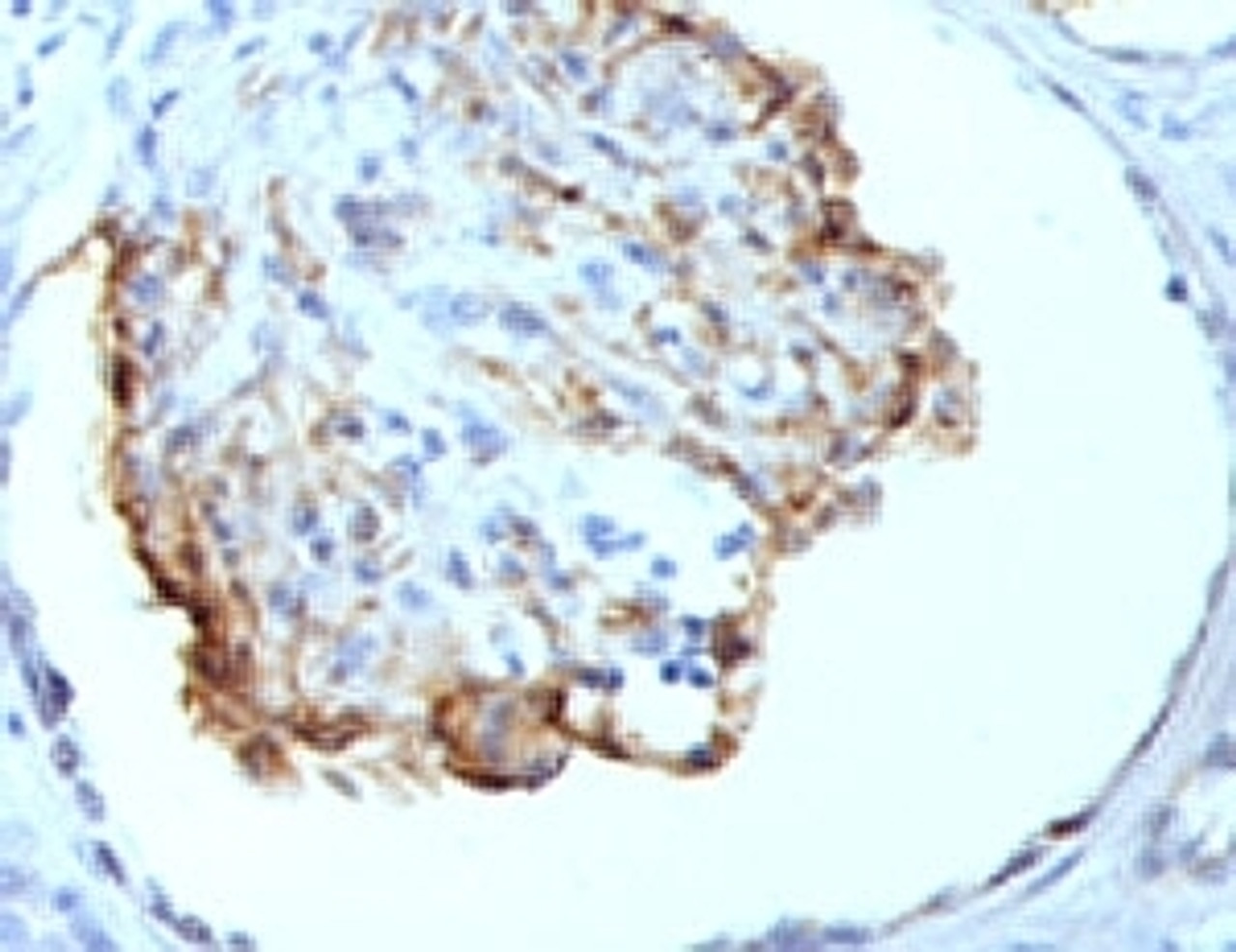Product Description
WT1 Antibody [WT1/857] | 33-480 | ProSci
Host: Mouse
Reactivity: Human
Homology: N/A
Immunogen: A recombinant human protein was used as the immunogen for the WT1 antibody.
Research Area: Transcription, Cell Cycle, Cancer, Apoptosis
Tested Application: Flow, IF, IHC-P
Application: Flow Cytometry: 0.5-1 ug/million cells in 0.1ml
Immunofluorescence: 0.5-1 ug/ml
Immunohistochemistry (FFPE) : 0.5-1 ug/ml for 30 min at RT (1)
Prediluted format: incubate for 30 min at RT (2)
Optimal dilution of the WT1 antibody should be determined by the researcher.
1. Staining of formalin-fixed tissues requires boiling tissue sections in 10mM Citrate buffer, pH 6.0, for 10-20 min followed by cooling at RT for 20 min.
2. The prediluted format is supplied in a dropper bottle and is optimized for use in IHC. After epitope retrieval step (if required) , drip mAb solution onto the tissue section and incubate at RT for 30 min.
Specificiy: N/A
Positive Control 1: N/A
Positive Control 2: N/A
Positive Control 3: N/A
Positive Control 4: N/A
Positive Control 5: N/A
Positive Control 6: N/A
Molecular Weight: N/A
Validation: N/A
Isoform: N/A
Purification: Protein G affinity chromatography
Clonality: Monoclonal
Clone: WT1/857
Isotype: IgG1, kappa
Conjugate: Unconjugated
Physical State: Liquid
Buffer: PBS with 0.1 mg/ml BSA and 0.05% sodium azide
Concentration: 0.2 mg/mL
Storage Condition: Aliquot and Store at 2-8˚C. Avoid freez-thaw cycles.
Alternate Name: WT1, GUD, WAGR, WIT-2, WT33, AWT1, NPHS4, EWS-WT1
User Note: Optimal dilutions for each application to be determined by the researcher
BACKGROUND: Recognizes a 47-55kDa-tumor suppressor protein, identified as Wilm's Tumor (WT1) protein. The antibody reacts with all isoforms of the full-length WT1 and also identifies WT1 lacking exon 2-encoded amino acids, frequently found in subsets of sporadic Wilm s tumors. WT1, a sporadic and familial pediatric kidney tumor, is genetically heterogeneous. Wilm s tumor is associated with mutations of WT1, a zinc-finger transcription factor that is essential for the development of the metanephric kidney and the urogenital system. The WT1 gene is normally expressed in fetal kidney and mesothelium, and its expression has been suggested as a marker for Wilm s tumor and mesothelioma. WT1 protein has been identified in proliferative mesothelial cells, malignant mesothelioma, ovarian carcinoma, gonadoblastoma, nephroblastoma, and desmoplastic small round cell tumor. Lung adenocarcinomas rarely stain positive with this antibody. WT1 protein expression in mesothelial cells has become a reliable marker for the diagnosis of mesotheliomas.
 Euro
Euro
 USD
USD
 British Pound
British Pound
 NULL
NULL

![WT1 Antibody [WT1/857] WT1 Antibody [WT1/857]](https://cdn11.bigcommerce.com/s-452hpg8iuh/images/stencil/1280x1280/products/575318/811878/porsci_lo__79508.1648973713__05763.1649091891.png?c=2)

![WT1 Antibody [WT1/857] WT1 Antibody [WT1/857]](https://cdn11.bigcommerce.com/s-452hpg8iuh/images/stencil/100x100/products/575318/811878/porsci_lo__79508.1648973713__05763.1649091891.png?c=2)

![WT1 Antibody [WT1/857] WT1 Antibody [WT1/857]](https://cdn11.bigcommerce.com/s-452hpg8iuh/images/stencil/500x659/products/575318/811878/porsci_lo__79508.1648973713__05763.1649091891.png?c=2)








